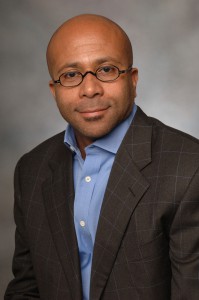Remembering African American Humanism

by Dr. Anthony B. Pinn
Black churches dominate popular imagination in the United States. And this Christian-bias is more intense during Black History Month, when talk of great figures such as Reverend Martin Luther King, Jr., enhances the assumed centrality of the churches. There is no doubt that the black Christianity tradition has played a significant role in the life of African Americans in particular and Americans in general. Yet it is important to remember the role non-theistic orientations have played in the development of the battles for social justice chronicled during February.
The moral and ethical commitments of African Americans have never been limited to the restrictions on conduct imposed through superstition and the gods of various mythologies. Some, like Frederick Douglass and later James Forman, pushed for the full humanity of African Americans through an appeal to only what human ingenuity and creativity could muster. This human-centered orientation has been just as vital, just as viable, and just as worthy of remembrance and celebration.
Sure, those I have named are well known in many circles, yet what is missing is recognition of their humanism—acknowledgements of the significant role reason and human effort have played in the advancement of this country. The efforts of these humanists and others like them aren’t met with a hearty “Amen!” But that’s okay. Important, however, is the occasional pause to reflect on the importance of the ethical platform and moral compass given us as part of the legacy of a long line of named and unnamed African American humanists.
But even atheists and humanists often fail to recognize the depth of African American involvement. Black History Month, then, is also an opportunity to offer an internal critique—an adjustment to a significant oversight within our ranks. We might begin this process by recognizing differing relationships to the modern period that anchors so much of our thinking and doing.
It isn’t safe to assume all humanists have the same relationship to the modern period. Keep in mind that the brutality encountered by Africans as part of the slave trade is lodged within the “stuff” of modernity. African American humanism, mindful of the terror and dread marking the de-humanization of those of African descent, proclaims the significance of humanity over against efforts to deny the importance of black bodies. In this way, African American humanism is both a celebration of the modern period and a critique of the modern period. Complexity. Tension. Paradox. This should give us pause, and should encourage real reflection on what it has meant and what it means to be African American and humanist. Read what African American humanists have written, listen to what they say, and allow it to have an effect.
Even within humanist and atheist circles where there is at least the “shadow” presence of African Americans, we tend to simply call the roll of grand humanists who have maintained the tradition. While this recognition of legacy is vital (particularly at this time of the year), I propose we dig deeper and more fully express the sensibilities of a human orientation painstakingly implied by African American humanists and their non-theistic ancestors. That is to say, rather than simply acknowledging the diversity of our movement, we might take the next step and make diversity—difference—the hallmark of our movement, a core value without which we fail to live out the best of the humanist tradition and agenda.
Dr. Anthony B. Pinn is the Agnes Cullen Arnold Professor of Humanities at Rice University and director of research at the Institute for Humanist Studies.
